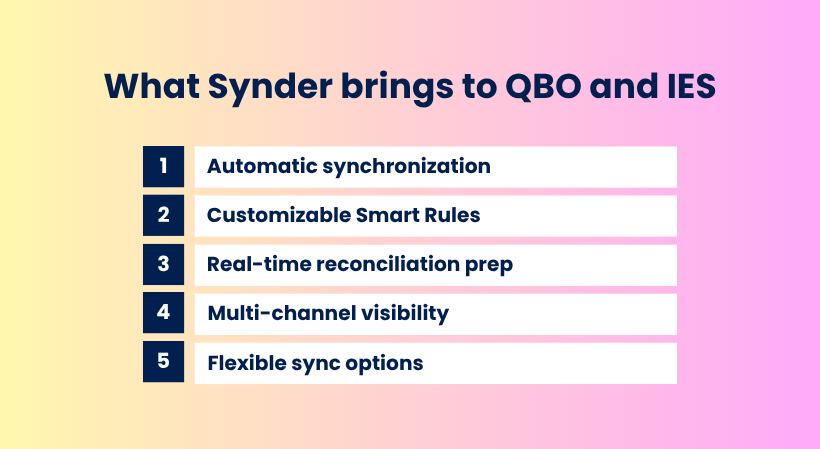Imagine you’re standing at a crossroads. On one side, you have QuickBooks Online Advanced, fast and familiar, like a sleek sports car built for smooth rides on the open road. On the other, you see Intuit Enterprise Suite (IES), a powerful all-terrain vehicle designed to handle the steep hills and heavy loads of enterprise accounting.
Both come from the same trusted maker, Intuit, but they’re designed for different stages of growth. The real challenge isn’t choosing between QuickBooks Online Advanced and Intuit Enterprise Suite. It’s making sure your financial data flows smoothly no matter which system you’re on.
And here’s where Synder comes into play. As your navigation system for both roads, Synder connects your transaction data to either QuickBooks Online Advanced or Intuit Enterprise Suite, keeping every record aligned, categorized, and ready for reconciliation. Whether you’re cruising on the cloud or driving through enterprise-level complexity, Synder keeps your accounting on track.
TL;DR
- Intuit’s accounting ecosystem now serves businesses of every size, from cloud-focused startups using QuickBooks Online Advanced to multi-entity organizations adopting Intuit Enterprise Suite.
- QuickBooks Online Advanced emphasizes accessibility, automation, and integration, helping small and midsize companies manage finances efficiently in real time.
- Intuit Enterprise Suite introduces a modern general ledger with advanced reporting, consolidation, and compliance controls for enterprises managing complex financial structures.
- Synder integrates with QuickBooks Online Advanced and Intuit Enterprise Suite, syncing transaction data from ecommerce platforms and payment gateways.
- Automation through Synder allows businesses to eliminate manual entry, maintain data accuracy, and prepare for seamless scalability within the evolving Intuit ecosystem.
Understanding the Intuit ecosystem
Intuit’s accounting universe has evolved into two distinct worlds. QuickBooks Online Advanced focuses on cloud simplicity and automation, helping growing companies manage their finances without the hassle of servers or manual data entry. Intuit Enterprise Suite, meanwhile, steps up as a robust general ledger for larger organizations, where data control, compliance, and consolidation are essential.
You can think of it like this: QuickBooks Online Advanced is the efficient coworking office where everything is digital and connected. Intuit Enterprise Suite is the corporate headquarters, purpose-built for big operations, layered permissions, and complex reporting.
What makes Intuit’s approach unique is that it doesn’t force businesses to leave the ecosystem when they grow. Instead, it provides a clear path, from startup to enterprise, without losing the familiar structure that accountants trust.
And throughout all that journey, Synder acts as the connective tissue, syncing transaction data from multiple platforms into either system. So when the time comes to move from QuickBooks Online to IES, your accounting data can move with you, clean and ready.
Ready to see how Synder connects your business to Intuit Enterprise Suite or QuickBooks Online Advanced? Start a free account or book a demo to explore how every sale, fee, and payout syncs automatically, giving you clean and accurate books without manual work.
What makes Intuit Enterprise Suite different
Intuit Enterprise Suite isn’t a facelift for older products. It’s an entirely new general ledger designed for enterprise-level operations that need more control, more structure, and more analytical power.
IES allows companies to manage multiple entities under one roof, perform intercompany eliminations, and create consolidated reports that reflect the entire business picture. It’s built to handle complexity without sacrificing visibility.
If QuickBooks Online is like running a business from a single dashboard, IES feels like stepping into a command center. You can set detailed access permissions, monitor audit trails, and enforce approval workflows that align with corporate policies. It’s a serious upgrade for organizations managing thousands of transactions daily or operating across several countries.
Yet, even this powerful setup needs seamless data input to reach its full potential. Synder can fill that role, automating how sales, fees, refunds, and taxes flow from ecommerce platforms and payment systems like Stripe into IES, exactly as it already does for QuickBooks Online. The result is a unified financial ecosystem where every transaction is accurate, categorized, and ready for analysis.
What keeps QuickBooks Online Advanced relevant
QuickBooks Online Advanced remains one of the most agile accounting solutions for small and midsize businesses. It’s cloud-native, meaning your team can access financials anywhere, anytime. There’s no installation, no maintenance, and no waiting for IT support.
It’s also designed for automation. You can schedule invoices, match transactions automatically, and use smart categorization rules that save hours every week. When combined with Synder, that automation goes even further. Sales from Shopify, Stripe, or Amazon flow into QuickBooks automatically, categorized by class, tagged by product, and matched to deposits.
QuickBooks Online Advanced shines for companies that value speed and simplicity. It provides real-time dashboards, profitability tracking by class or location, and integrations with hundreds of apps. Think of it as a smart, connected control room where finance never gets stuck in spreadsheets.
If you run a growing business with a clear need for automation and collaboration, QuickBooks Online Advanced keeps you efficient without the heavy overhead of an enterprise system. And if you ever reach the point where your structure outgrows it, the transition to IES will feel like a natural next step. Especially with Synder ensuring your data is ready to move.
The core comparison: structure, control, and scale
Comparing Intuit Enterprise Suite and QuickBooks Online Advanced is a bit like comparing a high-performance SUV with a luxury hybrid, which are both powerful, but they’re built for very different kinds of journeys. Each platform serves a unique stage of business growth and operational complexity.
Let’s break down the core feature areas where the two systems diverge most:
Accounting structure and scalability
In QuickBooks Online Advanced, reporting focuses on clarity and speed. You can track profit by location, monitor expenses, and forecast cash flow directly from the dashboard. It’s like driving with a bright digital display that shows every metric you need in real time.
Intuit Enterprise Suite, in contrast, is more like a fully equipped cockpit. It doesn’t just show the numbers, but reveals relationships between them. Multi-dimensional reporting lets you analyze data across subsidiaries, cost centers, and departments. It connects strategy with operations, giving CFOs the visibility they need to steer with confidence.
Synder strengthens both systems by feeding in high-quality, granular data. It keeps sales, fees, and taxes consistent across platforms, ensuring that reports reflect reality rather than assumptions. When your data is clean, your insights are clearer, no matter how advanced the reporting engine is.
Deployment and data management
QuickBooks Online Advanced thrives on accessibility. You can log in from anywhere, track transactions, and approve payments without touching a server. Its data protection relies on Intuit’s secure cloud infrastructure with automatic backups and encryption.
Intuit Enterprise Suite introduces a different level of control. Finance administrators can configure access by department, region, or entity, ensuring that sensitive data stays visible only to authorized users. Audit trails record every action, and permissions can be aligned with internal compliance standards.
Synder complements both approaches. It keeps your data flow organized from the moment a sale happens. Every transaction from Shopify, PayPal, or Stripe lands in your accounting system already categorized, matched, and ready for reconciliation. Whether your books live in QuickBooks Online or IES, Synder guarantees the same reliability and precision.
Automation and workflows
In QuickBooks Online Advanced, automation revolves around saving time: recurring invoices, automatic bank reconciliation, smart categorization, and rule-based transaction mapping.
IES takes automation to the governance level. Think approval hierarchies, journal entry validation, and controlled workflows for purchasing or expense management. It’s built to enforce policies, not just speed up routine tasks.
Reporting and analytics
QuickBooks Online Advanced’s reporting is intuitive and visually clear. It offers dashboards that track KPIs like revenue, expenses, and profit by class or location, often enough for operational decisions.
Intuit Enterprise Suite introduces advanced reporting capabilities closer to what you’d expect from a mid-market ERP: customizable dimensions, consolidated statements, and deeper audit trails. It’s not just about what happened, but why it happened, and how one business unit’s performance affects another.
Customization and extensibility
QuickBooks Online Advanced offers API connections and an ecosystem of apps in the Intuit App Store. It’s great for connecting ecommerce, CRM, or payroll platforms.
IES is expected to expand this flexibility even further, providing custom data models and API access suited for enterprise developers and large finance teams. It’s being positioned as a platform that IT and finance can truly build on, not just use.
In essence, QuickBooks Online Advanced is built to keep financial management simple and fast, while Intuit Enterprise Suite is built to give large organizations structure, depth, and control. The first helps you move faster; the second helps you move smarter.
Inventory management
QuickBooks Online includes basic inventory tracking suitable for light product-based businesses. However, once you deal with warehouses, batch tracking, or multiple fulfillment locations, it starts to feel limited.
IES offers a more advanced inventory management layer that integrates with supply chain operations, enabling multi-warehouse tracking, cost layer control, and detailed COGS mapping. This is ideal for manufacturers, distributors, and retailers with complex stock movements.
| Feature | QuickBooks Online Advanced | Intuit Enterprise Suite |
| Accounting structure and scalability | Managing single-entity books and simple structures | Consolidating multi-entity operations and complex ownerships |
| Deployment and data management | Cloud-based access with automatic backups and encrypted data | Granular on-premise or hosted control with permissions, audit trails, and compliance alignment |
| Automation and workflows | Automating invoices, reconciliation, and categorization | Enforcing approval hierarchies and policy-driven workflows |
| Reporting and analytics | Tracking KPIs through clear dashboards | Delivering multi-dimensional reporting and audit trails |
| Customization and extensibility | Connecting via APIs and App Store integrations | Building custom data models and enterprise integrations |
| Inventory | Handling basic product tracking | Managing multi-warehouse, batch, and cost-layer operations |
| Best for | Growing SMBs and service-based companies | Multi-entity organizations and complex accounting teams |
If QuickBooks Online Advanced helps you move faster, Intuit Enterprise Suite helps you move smarter. One focuses on agility, the other on depth.
And Synder enhances both, turning transaction chaos into clean, organized books no matter which platform you choose.
How Synder bridges both worlds
Synder is the universal accounting automation software for both business systems. It connects ecommerce platforms, payment processors, and accounting tools to create one synchronized source of truth.
Here’s what Synder brings to both QuickBooks Online Advanced and Intuit Enterprise Suite:
- Automatic synchronization of every sale, fee, refund, and tax from platforms like Shopify, Stripe, PayPal, and Amazon.
- Customizable Smart Rules that adapt to your unique workflow.
- Real-time reconciliation prep that matches payouts to your bank feed.
- Multi-channel visibility that brings all financial data into one reporting environment.
- Audit-ready precision with rollback.
- Flexible sync options, including per-transaction and summary sync modes.
Whether you’re running on QuickBooks Online or planning to expand into Intuit Enterprise Suite, Synder keeps your books consistent, accurate, and ready for insight.

Final thoughts
Intuit is building a continuous ecosystem that grows with your business. As part of that ecosystem, QuickBooks Online Advanced gives companies the freedom to move fast, while Intuit Enterprise Suite adds the structure needed to scale with confidence.
But the real magic happens when your accounting data flows seamlessly towards them. Synder makes that possible by automating how the details get from your ecommerce platforms to accounting software. It unifies your financial data and ensures that no matter which Intuit platform you use, your books remain clean, synchronized, and audit-ready.
The road to better accounting doesn’t come down to choosing a single destination. What matters is keeping the process smooth, connected, and ready for growth. And that’s exactly what Synder was created to do.
FAQ
What is the Intuit Enterprise Suite?
Intuit Enterprise Suite is a modern general ledger platform developed by Intuit for enterprise-level organizations. It supports multi-entity accounting, consolidated reporting, approval workflows, and detailed audit trails. IES allows large businesses to operate with precision and scalability while remaining connected to the familiar Intuit ecosystem.
Is QuickBooks Online Advanced better than Intuit Enterprise Suite?
Neither system is strictly better, as they simply fit different needs. QuickBooks Online Advanced suits growing small and midsize businesses that want easy cloud access and built-in automation. Intuit Enterprise Suite fits larger companies managing multiple entities and requiring deeper controls and reporting. Whichever platform you choose, both work far more smoothly and reliably when paired with Synder.
What is the difference between QuickBooks Enterprise and QuickBooks Online?
QuickBooks Enterprise is a desktop-based program that offers advanced inventory, reporting, and job costing features but requires local installation and manual maintenance. QuickBooks Online operates entirely in the cloud, giving users automatic updates, real-time collaboration, and integrations with hundreds of applications. Enterprise focuses on depth and control, while QuickBooks Online focuses on accessibility and automation.
What is the difference between QuickBooks Online and QuickBooks Online Advanced?
Both versions share the same cloud-based foundation, but QuickBooks Online Advanced offers more capacity and control. Standard QuickBooks Online is perfect for small businesses that need basic bookkeeping, while Advanced adds automation, customizable reporting, and role-based permissions. It’s best suited for companies that have outgrown the basic version and want to handle larger transaction volumes with less manual effort.






